"Soon Sayli, Chalis Katesi Ramaunla"
We use Google Cloud Translation Services. Google requires we provide the following disclaimer relating to use of this service:
This service may contain translations powered by Google. Google disclaims all warranties related to the translations, expressed or implied, including any warranties of accuracy, reliability, and any implied warranties of merchantability, fitness for a particular purpose, and noninfringement.


Songwriter Harak Saud wrote the song 'Soon Sayli...' eight years ago, which is his first composition in his life. Since then he has composed 32 songs. Most of the 'hits' have become 'super-hits' and some have also become 'super-dupper'. From background music to songwriting, Hark hasn't looked back since 'Soon Saili...'.


Saud made a grand entry into the music industry with 'Soon Saili...'. The pain and tears, memories and jokes in foreign employment are filled with great fun in the song. As it spoke about the pain of the Nepali society, this song was adopted by everyone and it became popular with everyone, "Soon Sayli...Chalis Katesi Ramaunla." The math of putting 40 points on a
song is ridiculous. "Often, Nepali youths get citizenship at the age of 17/18, then get a passport and fly abroad before the age of 20. He will do something in the next 20 years," said the lyricist Saud, recalling the moment when he wrote the much-loved Haraf, "He will do something from the wealth he has earned, the family will prosper. We wrote these lines in the 'concept' of using the skills learned abroad.'
Song- Even though he had no formal education in music, the desire to write songs was growing in some corner of Saud's heart, but the 'Aradhana Cafe' in Baghbazar was not letting his passion grow. Coincidence or written account, Aradhana Cafe used to be a gathering of music lovers. At the edge of that musical atmosphere, Hark used to sit silent. Understanding Hark's inclination, Kaliprasad Baskota said one day, "If there is 'interest' in the song, let's work together ∕" Then Hark told that he was excited to write the song.
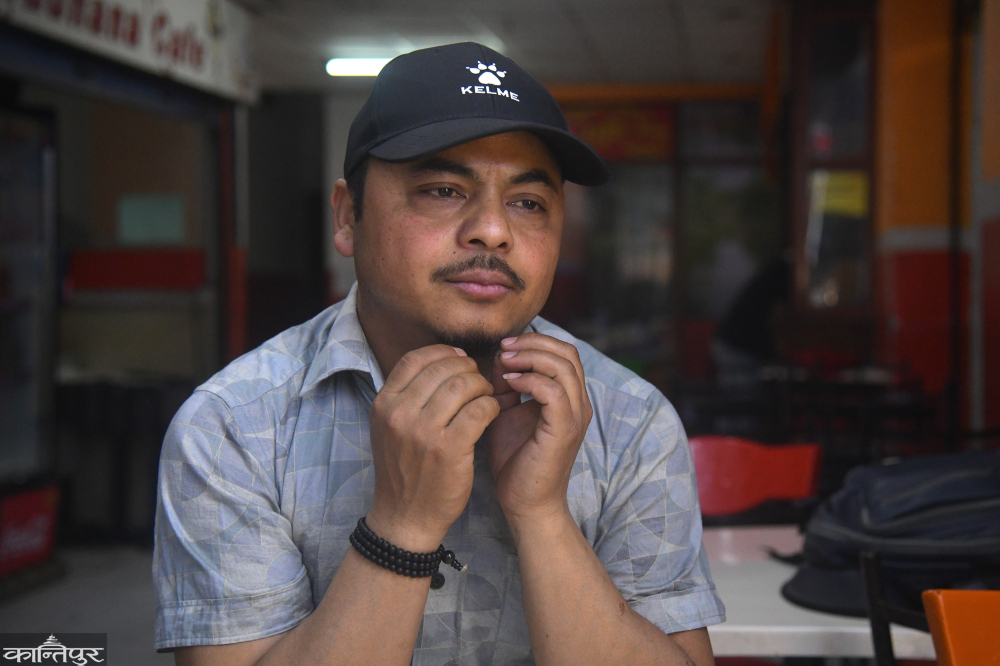 lyricist Harak Saud . Photos: Deepak KC/Kantipur The
lyricist Harak Saud . Photos: Deepak KC/Kantipur The
theme and tune were already in demand for Baskota, the words of the village were needed, and the current state of Nepali society had to be seen. He wondered what the youth who went abroad remembers the country/village the most. Did you wake up in the middle of the night after hearing the sound of threshing paddy in Okhal and the sound of the sledgehammer?'' Hark narrated that he had drawn the letters of 'Soon... Saili', remembering similar things from the village. After the release, the song created a sensation, Hark also became a hit with the song. That's why Hark thinks, "Nothing is found before the time, when the right time comes, no one can steal it."
'Curly Curly Kapal...' from the movie 'Captain', 'Hatti Dhungama...' from 'Premgeet 3', 'Dubo Phulyo...' from 'Kabaddi Kabaddi Kabaddi' written after 'Soon... Saili'. ' increased the height of Herc. Hark had written 'Dubo Phulyo...' for Hemant Rana, the singer of 'Soon Saili...'. Hemant wanted a song for a stage show. One day, sitting in Cinema Arts, Hemant was singing the song 'Dubo Phulyo...' on the guitar, the director Rambabu Gurung liked the song. There is an interlude in the film that made this song very popular, 'Dubo Phulyo Pati Hai Palayo, Baiguni Mayale Mutu Hai Jalayo...' After hearing this interlude, many questioned Hark, does Dubo also bloom? "Many people don't even remember that Dubo is blooming, if you look at Dubo that has been in Kanla for a long time, it looks like it's blooming," Hark said about the style he adopts in writing, "When you bring such small things from the village into the song, you can find a different flavor." Herk's specialty in
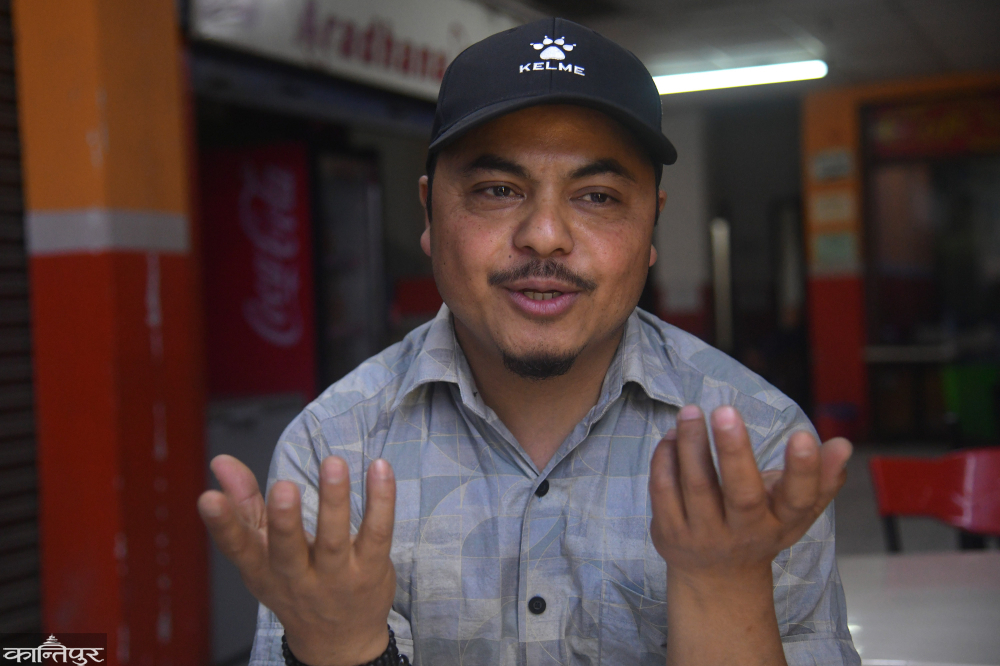 writing is to capture the subtle elements of the village and mix emotions and environment with it. Such as: the name on the forehead is gone, the future is in the game.... Sun Sayli...Hark has also mixed the verses of future games with Namlo and Bario. In 'Curly Curly Hair...', in the conversation between a young woman and an old woman, pepper was used as an image of the time of getting wrinkles. Carre!', a place to connect with issues and contexts, creating a world of characters, Hark is adept at playing with words. Ego tries to camp inside Hark as the
writing is to capture the subtle elements of the village and mix emotions and environment with it. Such as: the name on the forehead is gone, the future is in the game.... Sun Sayli...Hark has also mixed the verses of future games with Namlo and Bario. In 'Curly Curly Hair...', in the conversation between a young woman and an old woman, pepper was used as an image of the time of getting wrinkles. Carre!', a place to connect with issues and contexts, creating a world of characters, Hark is adept at playing with words. Ego tries to camp inside Hark as the
songs hit consecutively, but doesn't let it last long. "Listen Saili... After being hit continuously, I had a feeling that I am writing." There was a little bit of pride, but then it went away. I was advised to say goodbye to such a feeling as it came,' says Hark, 'if there are too many expectations, many creations will not be the same. Not all my songs are hits! I saw how many friends who were with me went up and down. I know that what I am will not last long.' While the songs of
films were continuously becoming 'hits', Hark wrote 'Ae Ni Lai' and 'Ompren Party Jitaide' in 'Santi Virus' but those songs did not take off as he said. Around the same time, he wrote another song for singer Manish Dhakal, 'Batouli....' For the video, Herk met Manish with Naveen Chauhan of 'Artmandu'. The video shows the old tradition of getting married at a young age, and when the groom is old enough to go to get the bride. This is the first 'music video' of actor Vipin Karki. He composed the words according to the story, "Tinauko Tiraima Bazar Batauli..." He imagined the story before writing the song. In Batauli Hark has put the word Raithane that speaks to the village. And through the words, he brought down the feelings of the groom on his long journey to pick up the bride.
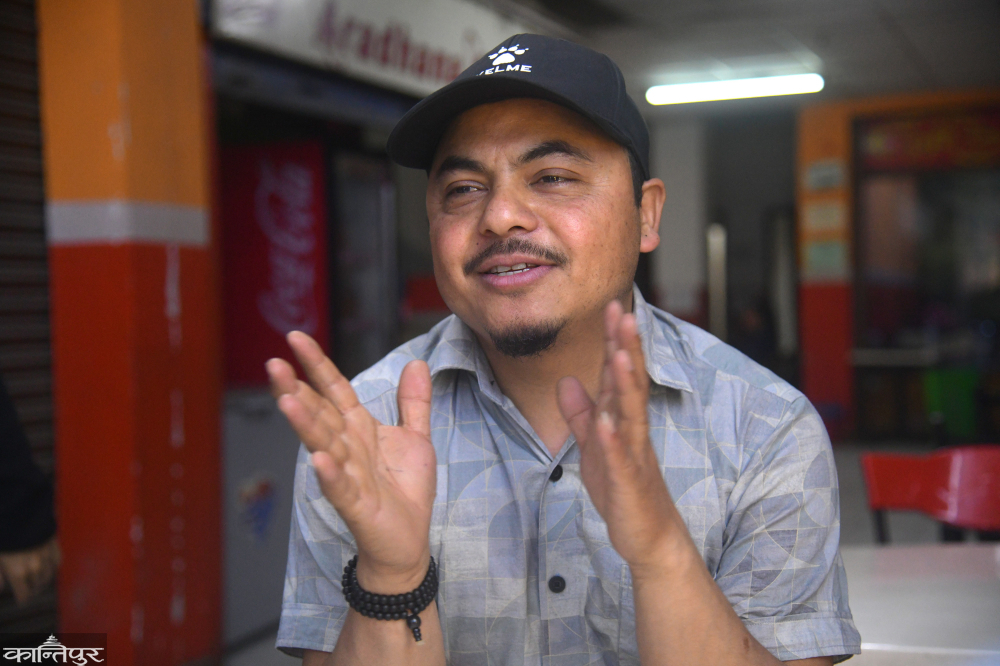 'Batouli...' not only showed the story of that time, but also showed Naveen and Hark the way forward together. Naveen wanted to differentiate 'Artmandu' from mainstream music. Therefore, after the discussion of showing the unseen, unsaid marginal stories in video and putting the feelings into words, the collaboration of these two went ahead. Towards the beginning of the collaboration, Hark sat down to write songs to tell the story of a farmer's family. A row, a house in the middle of a row. Wrote the song imagining a small family, cattle. While discussing that song, the story of that family stretched. If that family used to sell milk, now his children imagined that they would sell it by making curpi from that milk. Success and happy life after taking Churpi to the international market. It took 6 months to prepare the song while drawing the story and writing the words. 'Teenpate...' is a song written and made after a long time. Joining
'Batouli...' not only showed the story of that time, but also showed Naveen and Hark the way forward together. Naveen wanted to differentiate 'Artmandu' from mainstream music. Therefore, after the discussion of showing the unseen, unsaid marginal stories in video and putting the feelings into words, the collaboration of these two went ahead. Towards the beginning of the collaboration, Hark sat down to write songs to tell the story of a farmer's family. A row, a house in the middle of a row. Wrote the song imagining a small family, cattle. While discussing that song, the story of that family stretched. If that family used to sell milk, now his children imagined that they would sell it by making curpi from that milk. Success and happy life after taking Churpi to the international market. It took 6 months to prepare the song while drawing the story and writing the words. 'Teenpate...' is a song written and made after a long time. Joining
'Artmandu', Hark adopted a new style of writing. When writing other songs, after telling the environment, I used to imagine and write. But, After coming to 'Artmandu', I had to go on writing the interludes as required by the story," Hark says, "Looking at Sarar, it looks like a song. But each letter says something different. The music is also not old fashioned. Different words and different music for different parts of the story. However, the same music and words had to be matched.' Before writing
'Teenpate...' Hark had reached Ilam. At that time, he picked the tea leaves and placed them in his palm. When the mouth of the tea was touched, he bowed. Muna's price and Chahak felt the feeling of love. The same image was used in 'Tinpete...', 'Manaimanma love teinpete baidio...'
Self smile smile
Juntara tipi no one gives
The river flows drop by drop
The ocean has no source....
These words of three letters were so popular that from 'Tiktak' to 'Twitter', the same interjection was heard everywhere. The story of this letter is also separate in the video. When a girl who is married to a poor guy sees a couple riding a bike, her anxiety is revealed in the song through these words, 'Shirfool Shirai Laonla Kesh....?' These words show a little jealousy and the lack of the female character. The expression of courage given by the young man in that complaint is, 'Apain Muskau Musukk...' In this song which has been watched by more than 20 million people on YouTube, the story and the words of the song are full of stories and feelings. Looking at the last gap, this family now has the satisfaction and time that the Churpi business provides. And also a fair about love. This environment of theirs echoes in the voice of singer Sujan Chapagai, "Aau samau yi Naadi Mera, Timrei Naam panhint day and night." Lift these veils of my eyes, they are eager to see your face.'
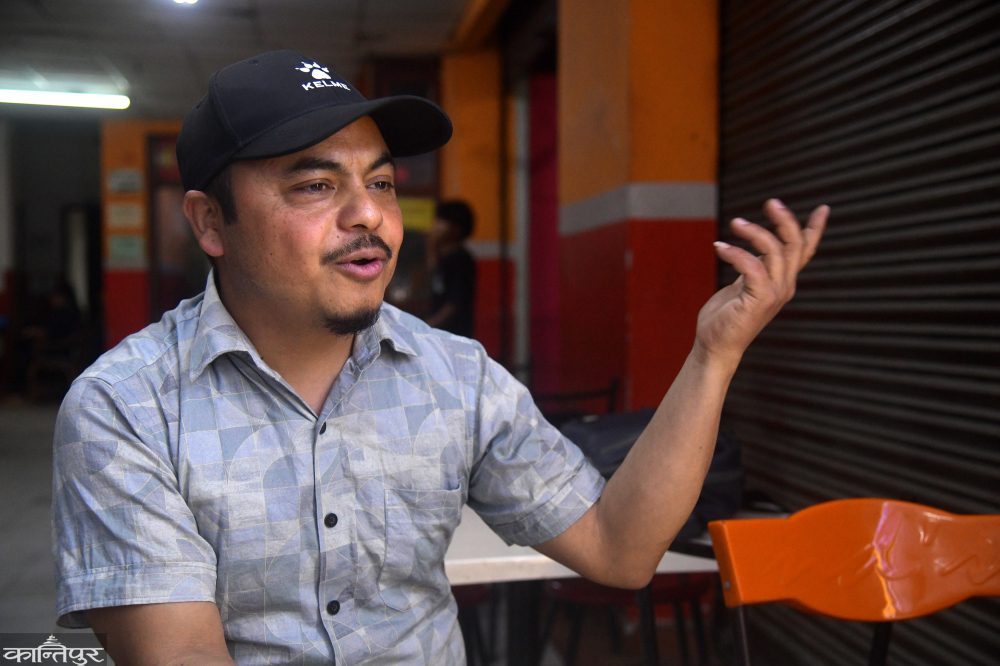 Before 'Teenpate...', the song 'Ke Maya Lagak Ra...' from 'Artmandu' went viral. They were preparing to release 'Tinpete...' after New Year's Eve, the lockdown happened. While the editing of 'Teenpate...' was going on, Hark kept going to 'Artmandu'. At that time, many footages of the song 'Lukichypi...' were left. In one of the footages, watching a scene of a fire, Herc was struck with poetry. Naveen's team created another story on the remaining footage, added the video, and turned the poem into a song. And it became, 'What love is there!' Who was also making 'Tik Tok' on this song. Then the song went viral,” Hark said. The exact Nepali words were kept in this song as well. Like: Ukhumai, Hurhuri, Ghutungtung. The summer of the east will be scorching, so we used sugarcane.
Before 'Teenpate...', the song 'Ke Maya Lagak Ra...' from 'Artmandu' went viral. They were preparing to release 'Tinpete...' after New Year's Eve, the lockdown happened. While the editing of 'Teenpate...' was going on, Hark kept going to 'Artmandu'. At that time, many footages of the song 'Lukichypi...' were left. In one of the footages, watching a scene of a fire, Herc was struck with poetry. Naveen's team created another story on the remaining footage, added the video, and turned the poem into a song. And it became, 'What love is there!' Who was also making 'Tik Tok' on this song. Then the song went viral,” Hark said. The exact Nepali words were kept in this song as well. Like: Ukhumai, Hurhuri, Ghutungtung. The summer of the east will be scorching, so we used sugarcane.
eastwards this word also moves,' Hark Ke Maya Laka and Ko Rachana reached the womb, 'In one scene, the fog seems to be moving away. I put the flow of that fog into words.' The 'recording' of this song is also memorable. At that time Nishan Bhattarai was in Ilam, he came to Kathmandu in a milk wagon coming to Kathmandu. Alina arrived in Kathmandu sitting on the back of a journalist's bike. This song also established Elina and Nishan. The pair of Mukun Bhusal and Survina Karki was also liked by many. "Looking at you is enough, why do you want to go?" Hark's favorite words in this song are the interlude, "Your only love is felt, Jagchha Tantu Tantu". Hark feels that the catchy audio, short and sweet words made 'Ke Mayaya Lakka And...' go viral. He says that most of the songs of 'Artmandu' are 'hits' due to the effort made in visualisation, the innovative taste of singing, the diligence shown in music and the similar fine aspects of writing.
Herc also has unique anecdotes and memories of songwriting. Sometimes the words that have been digested for hours are not liked, sometimes the words that the director does not like become the audience's favorite. The story of writing the famous letter of steam is amazing. Even after writing the interval, there were no words for permanent. Director Chauhan, who came to see the 'location' to shoot the song, sent a video from Sandakpur to Hark. Soon the video came, he was doing yoga. After watching that video, he wrote in a normal style, 'Ke bho khai, khai keb bho. No, I am what I am, I flew away like steam.' Chapagai composed and sent those words towards the evening. The video of the song was shot in heart touching cold. The audience also liked this song featuring Seematir love.
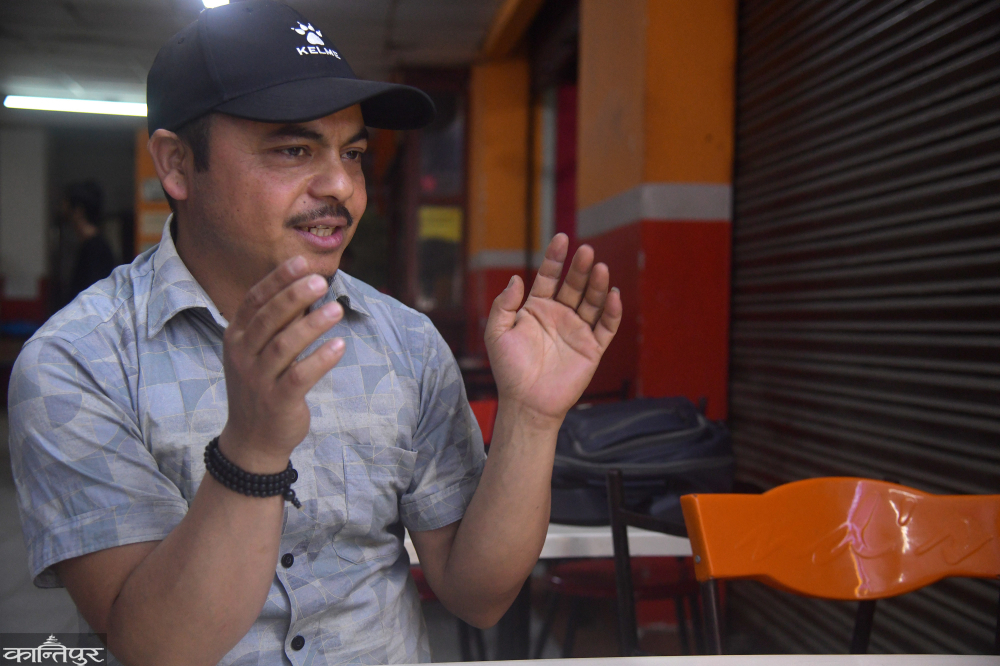 "Ghumighumi" written after "Baf" was preferred in Hark's language. Sujan sent Hark one day by humming the same tune which is included in the permanent of 'Ghumighumi'. He used to listen and repeat the same tune every morning and evening. In that tune, the mind wandered to the memory of the childhood maternal home. At Mamaghar Lake, Hark's house at Bessie. As soon as he got a break from school, he used to run to his uncle's house. Remembering the same winding road on his way to Mamaghar, he wrote, 'Ghumighumi Jharen Orali's road, you come that way instead of other coming...' That winding road is the heart of this song. Village road is never straight like city road. It is a detour. The road to my mother's house is just as winding. I wrote these words with that in mind,' says Hark, 'when someone comes that way while waiting, how sad it would be, that's why the word "you come that way instead of another way" came up. The last part of the song was written just three days before the video was released . The song deals with waiting for love and migration. Migration is also used figuratively through the word.
"Ghumighumi" written after "Baf" was preferred in Hark's language. Sujan sent Hark one day by humming the same tune which is included in the permanent of 'Ghumighumi'. He used to listen and repeat the same tune every morning and evening. In that tune, the mind wandered to the memory of the childhood maternal home. At Mamaghar Lake, Hark's house at Bessie. As soon as he got a break from school, he used to run to his uncle's house. Remembering the same winding road on his way to Mamaghar, he wrote, 'Ghumighumi Jharen Orali's road, you come that way instead of other coming...' That winding road is the heart of this song. Village road is never straight like city road. It is a detour. The road to my mother's house is just as winding. I wrote these words with that in mind,' says Hark, 'when someone comes that way while waiting, how sad it would be, that's why the word "you come that way instead of another way" came up. The last part of the song was written just three days before the video was released . The song deals with waiting for love and migration. Migration is also used figuratively through the word.
'Malchari's herds, sir, are trying to present the migration with the feeling that they have gone away. Herds of cattle are flying, so I used that for the image,'' said Hark, 'just like going to Gokyo may seem like a challenge, but the joy after reaching there is different.' After 'Ghumighumi', Hark had to write a song for the next video that the production team had shot.
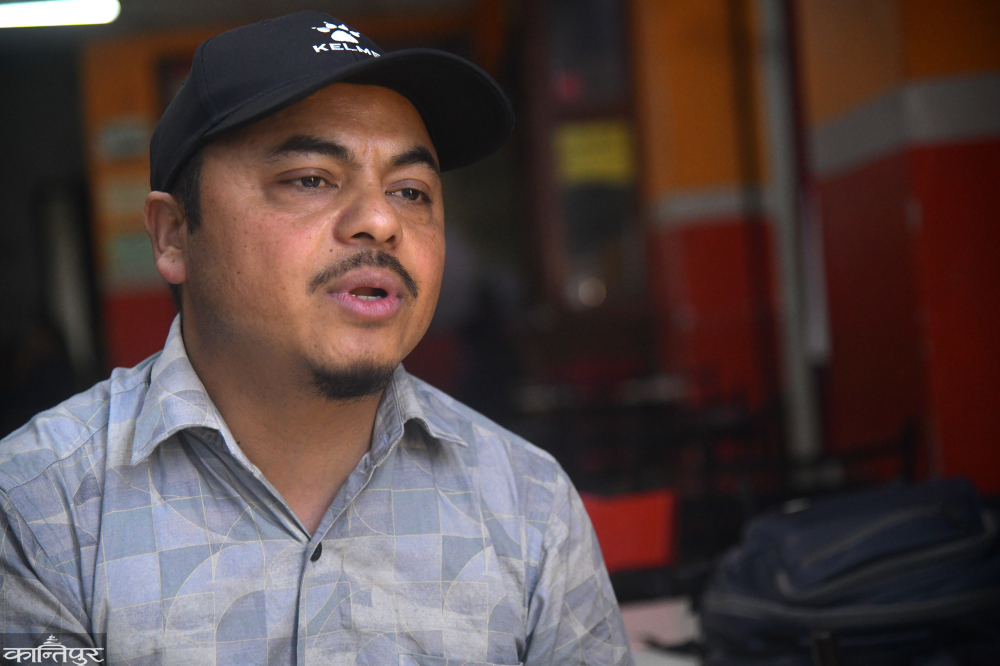 The song with lyrics 'Sunakhari' presents the loneliness of two elderly couples, their love and waiting for children. As it is said in Harak's song, Harak has reached the time to enjoy his age, he writes a song about the loneliness of old age. A similar writing challenge inspired Herc to write this song. As soon as I saw the video of the song, my face fell - 'It's not our serofero nor yours...' The old couple's land is not going to be taken away by them - 'It's our serofero nor yours'. break Looking at the 'views' of 32 songs written by Hark Saud so far, he looks like a songwriter who earns millions, but he complains that his earnings are still stuck in thousands. 'Royalty' has become a different thing. "It's time to enjoy watching songs, but the words of some songs feel like hitting the cheeks," 42-year-old Hark said, "Society and family started to accept, the name was also earned, but the price is negligible."
The song with lyrics 'Sunakhari' presents the loneliness of two elderly couples, their love and waiting for children. As it is said in Harak's song, Harak has reached the time to enjoy his age, he writes a song about the loneliness of old age. A similar writing challenge inspired Herc to write this song. As soon as I saw the video of the song, my face fell - 'It's not our serofero nor yours...' The old couple's land is not going to be taken away by them - 'It's our serofero nor yours'. break Looking at the 'views' of 32 songs written by Hark Saud so far, he looks like a songwriter who earns millions, but he complains that his earnings are still stuck in thousands. 'Royalty' has become a different thing. "It's time to enjoy watching songs, but the words of some songs feel like hitting the cheeks," 42-year-old Hark said, "Society and family started to accept, the name was also earned, but the price is negligible."


 २९.१२°C काठमाडौं
२९.१२°C काठमाडौं

















